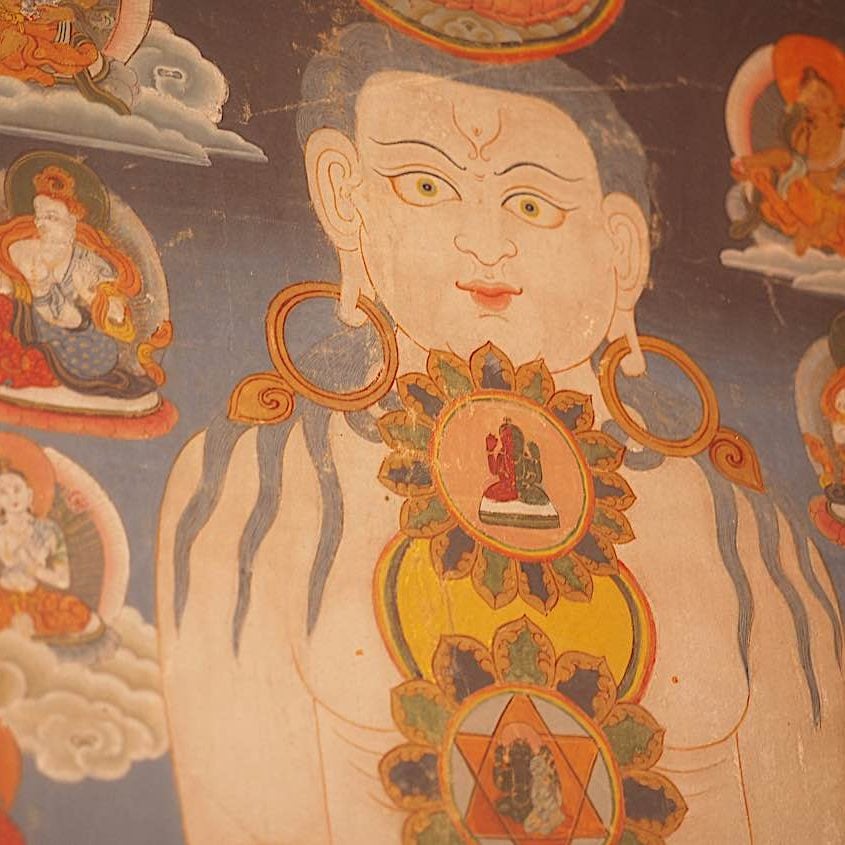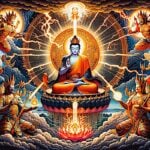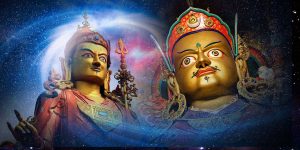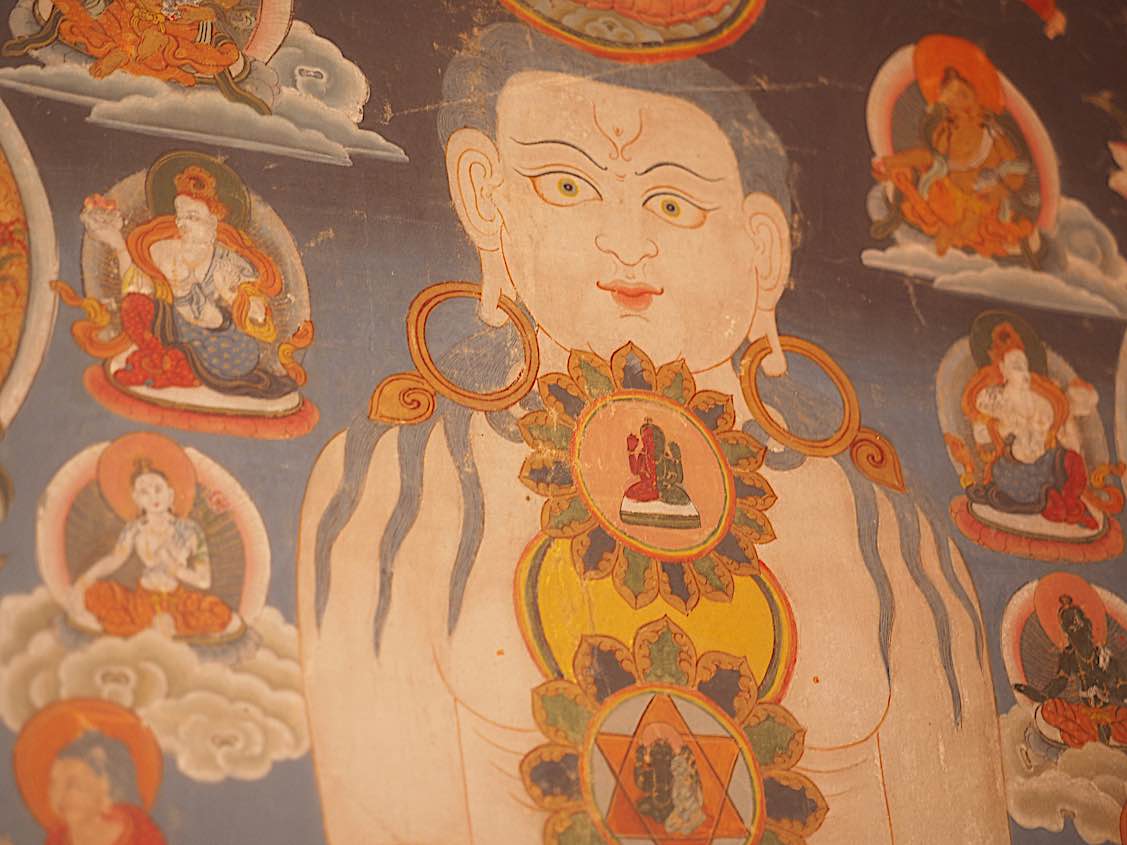Maximize Merits in Buddhism: Solar and Lunar Eclipses Practices, a Comprehensive Guide to Practice

Although we practice Dharma every day, there are certain days on which this practice yields additional karmic merit — or its opposite. Traditionally, these are Buddha anniversary days, and the solar and lunar eclipses.
It’s not about buying eclipse glasses and getting out to witness the event. On the day of the event, by tradition, we practice with extra devotion, knowing we do so for the benefit of all sentient beings, turning mindfully towards spiritual practice during these times is said to offer immense merit.
Why are eclipses considered auspicious? Eclipses are lunar in nature (solar eclipse is the sun, blocked by the moon). Shakyamuni Buddha was born, attained enlightenment and achieved paranirvana all on full moon days. For this reason all full moons, and eclipses (solar and lunar) are sacred days in Buddhism. According to the Vinaya Pitaka, Solar Eclipses have the highest merit, multiplied by 100 million.
In terms of Vajrayana Buddhism, eclipses also emulate the treasured practice in Generation Stage meditations, where we visualize our ordinary body dissolving into emptiness (like the blackness of a full eclipse), then re-arise as our Yidam — like the sun emerging from the total eclipse. Solar eclipses signify “new beginnings” — and making offerings and practicing Dharma on these days increasing the merit of our new beginning.
Quick Facts: Buddhism and Eclipses
- Buddhism views solar and lunar eclipses as auspicious events — unlike many other spiritual paths which view eclipses as negative.
- In the Anguttara Nikaya, it is mentioned that the Buddha encouraged monks to intensify their practice during lunar eclipses
- In Buddhist tradition, the merit of good deeds performed during an eclipse is said to be multiplied
- During eclipses, Buddhists are encouraged to engage in virtuous activities such as meditation, chanting, and making offerings
- The multiplication of merit during eclipses is not dependent on whether the eclipse is visible to the practitioner
- The Sutra of Golden Light, a Buddhist text, mentions the increased merit gained during an eclipse
- The Anguttara Nikaya, another Buddhist text, also references the special significance of eclipses
- Practices during an eclipse can include reciting sutras, practicing mindfulness, and performing acts of generosity
- The Buddha himself is said to have been born, enlightened, and passed into Nirvana during the full moon, which is closely related to lunar eclipses
- Many Buddhist communities around the world hold special ceremonies and practices during solar and lunar eclipses

The Pull of the Moon: and Buddha Day
Buddhist days and events of practice and celebration all revolve around lunar dates. Shakyamuni Buddha was born, later became Enlightened, gave his first Teaching at Deer Park, and finally attained Nirvana, all on Full Moon Dates. Full Moon Dates are the main Puja, offering and practice dates. Eclipses, which are the ultimate display of lunar magnificence, emphasize the merit of moon practice days.
Reciting Sutras is a strongly recommended merit-creating activity on Eclipse days, especially Vajra Cutter and Heart Sutra. Recite along with Buddha Weekly:
This concept finds its roots in several Buddhist texts. The Vinaya Pitaka, one of the Buddhist sacred texts, specifically mentions dedicated practice on eclipse days.1 It advises practitioners to focus on accumulating positive karma during these times because the fruitful results of these actions will be greatly multiplied.
When an eclipse occurs:
- Be extra mindful of every activity and action — karma is activity, both negative and positive
- Practice generosity
- Volunteer for altruistic activities and especially Dharma activities
- Practice your Yidam if you have one
- Recite Sutras
- Recite purifying mantras such as Vajrasattva or your Yidamf
- Do Vajrasattva or other purification practices — the purification is enhanced
- Refrain from adverse actions. Remember, the impact of negative karma is also said to increase on eclipse days2

The Sutras emphasize that taking refuge in the Buddha, Dharma, and Sangha (the Three Jewels) holds unique weight on eclipse days. An act of generosity, intended with purity of heart and conducted mindfully, will have magnified positive implications to your spiritual progress3. Eclipse days invite us to engage actively with our practice and sow seeds of merit that will grow seemingly beyond the scope of our standard practice.
Vajrasattva mantras are recommended on Eclipse days to “multiply” the purification of negative karma:
Practical Guide: Engaging in Buddhist Practices During Eclipse
Embracing the potent vibes of celestial happenings, such as solar and lunar eclipses, can greatly invigorate your journey as a Buddhist practitioner. Lama Zopa Rinpoche from the Foundation for the Preservation of the Mahayana Tradition asserts that these unique events bring auspiciousness to our spiritual practices (FPMT, n.d.). Crafting an intentional practice allows us to connect deeply with this cosmic synchrony and importantly, to gather extraordinary merit.
These merit-increasing windows of time, as per Lama Zopa Rinpoche’s teachings, have the potential to magnify the merit garnered from our practices:
- Rejoicing in merits for the benefit of others.
- Reading scriptures like the Vajra Cutter Sutra.
- Chanting the Names of Manjushri, the 108 names of Tara or the names of Avalokiteshvara
- 21 Taras Practice or the Praise to 21 Taras
- Meditating on emptiness and bodhicitta
- Reciting OM MANI PADME HUM or any of your Yidam mantras
- Practicing your Sadhanas and Pujas, especially of your personal Yidam (Meditation aspect of Buddha)
Practicing 21 Taras Praise is especially recommended (here in Sanskrit — English is available on the Buddha Weekly Youtube channel: https://www.youtube.com/@BuddhaWeekly)
Specifically for Solar Eclipses, Lama Zopa recommended:
- 35 Buddhas practice (purifying)
- Vajrasattva practice and mantras (purifying)
- Reciting Sutra of Golden Light
- Reciting Arya Sanghata Sutra
- Reciting Vajra Cutter Sutra
Both Positive Merit and Negative Karma Multiplied
Although this is a time of “new beginnings” it is also a time when both positive merit and negative karma are multiplied.
According to Tibetan Buddhist tradition, the energy of positive and negative actions is amplified during these events (Study Buddhism, n.d.). This intensification motivates us to be more mindful of our thoughts, words, and actions. This is a valuable time to avoid negative behavior, indulge in virtues and perform good deeds.
Amitabha’s Dharani is also a recommended practice. Chant along:
Another meritorious activity that can be leased upon during eclipse days is the recitation of specific sutras like the Sutra of Golden Light and Sanghata Sutra. Doing so with strong dedications further adds to the merit magnification.
Tread responsibly, dear practitioners. Be acutely aware that decisions and actions during eclipses create deeply imprinted consequences. Positive aspects from this period could become strongly rooted in your life. Indeed, eclipses encapsulate the fundamental Buddhist principle of understanding the true nature of the mind and maintaining a positive mindset, understanding impermanence and the true nature of reality.
Eclipses can be profound opportunities for growth and merit for Buddhist practitioners. Tibetan Buddhists, for instance, practice the Kunzang Monlam prayer on such events, as well as on solstices and equinox days (Rigpa Wiki, n.d.). Similarly, any beneficial practice that resonates with you can be performed during lunar and solar eclipses, bringing an abundance of auspicious possibilities for spiritual upliftment within your reach.
More articles by this author

Guru Rinpoche is ready to answer and grant wishes: “Repeat this prayer continuously” for the granting of wishes

Buddhist body mandala practice in Vajrayana Buddhism — and riding the winds of the inner body “The prana goes where the mind goes.””

4 Guardians of the World and Dharma: the Watchers of the World: the Four Heavenly Kings in Buddhism, Their Mantras and Practice
Search
Latest Features
Please support the "Spread the Dharma" mission as one of our heroic Dharma Supporting Members, or with a one-time donation.
Please Help Support the “Spread the Dharma” Mission!

Be a part of the noble mission as a supporting member or a patron, or a volunteer contributor of content.
The power of Dharma to help sentient beings, in part, lies in ensuring access to Buddha’s precious Dharma — the mission of Buddha Weekly. We can’t do it without you!
A non-profit association since 2007, Buddha Weekly published many feature articles, videos, and, podcasts. Please consider supporting the mission to preserve and “Spread the Dharma." Your support as either a patron or a supporting member helps defray the high costs of producing quality Dharma content. Thank you! Learn more here, or become one of our super karma heroes on Patreon.
Lee Kane
Author | Buddha Weekly
Lee Kane is the editor of Buddha Weekly, since 2007. His main focuses as a writer are mindfulness techniques, meditation, Dharma and Sutra commentaries, Buddhist practices, international perspectives and traditions, Vajrayana, Mahayana, Zen. He also covers various events.
Lee also contributes as a writer to various other online magazines and blogs.

















